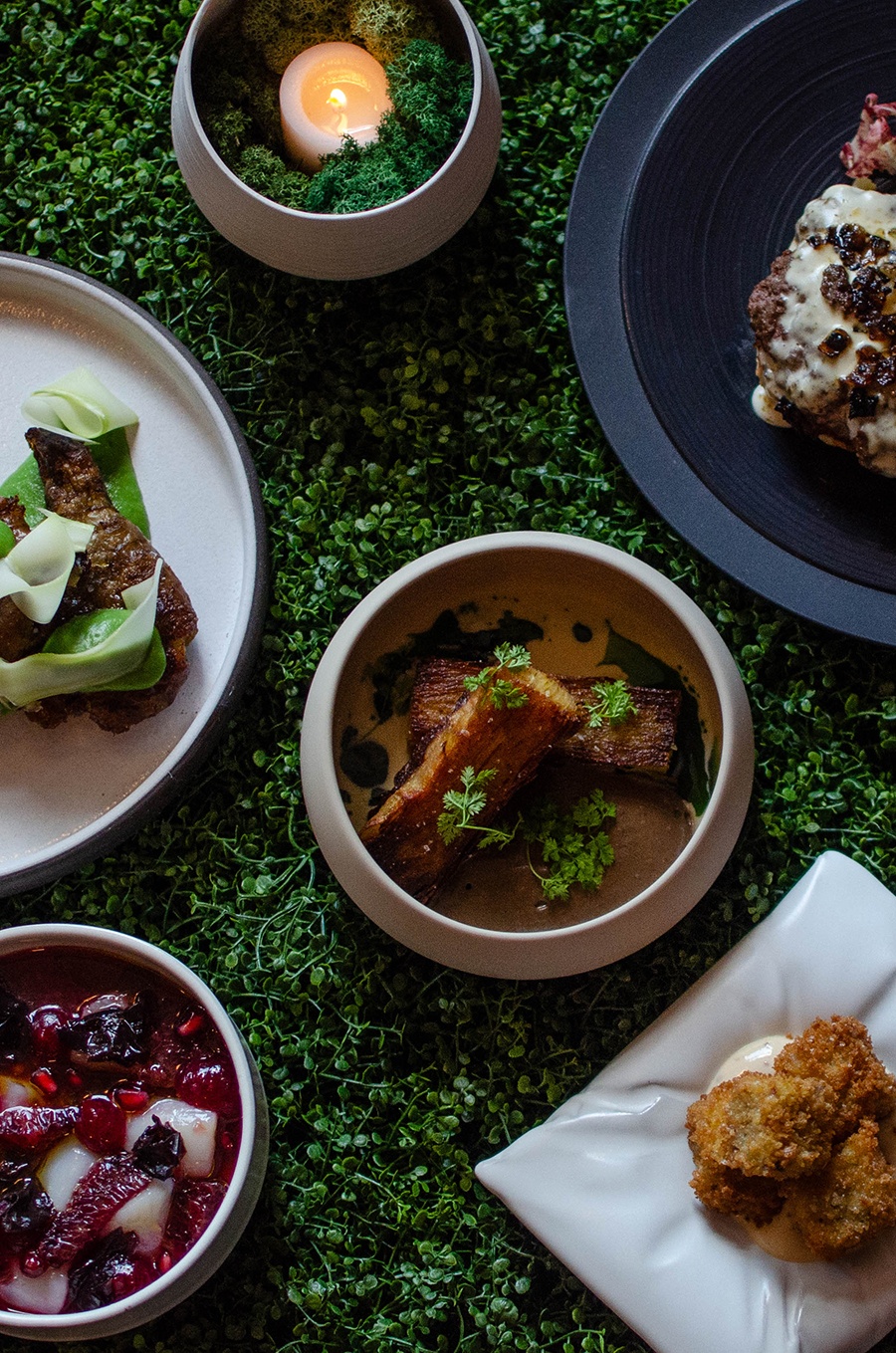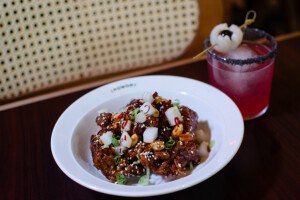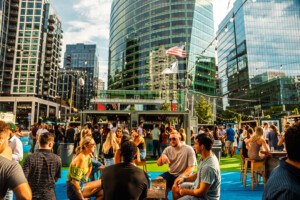Cambridge’s Fallow Kin Takes Farm-to-Table Dining to the Next Level
The forthcoming Central Square restaurant embraces local sourcing, vegetable-forward dishes, and zero-waste aspirations.
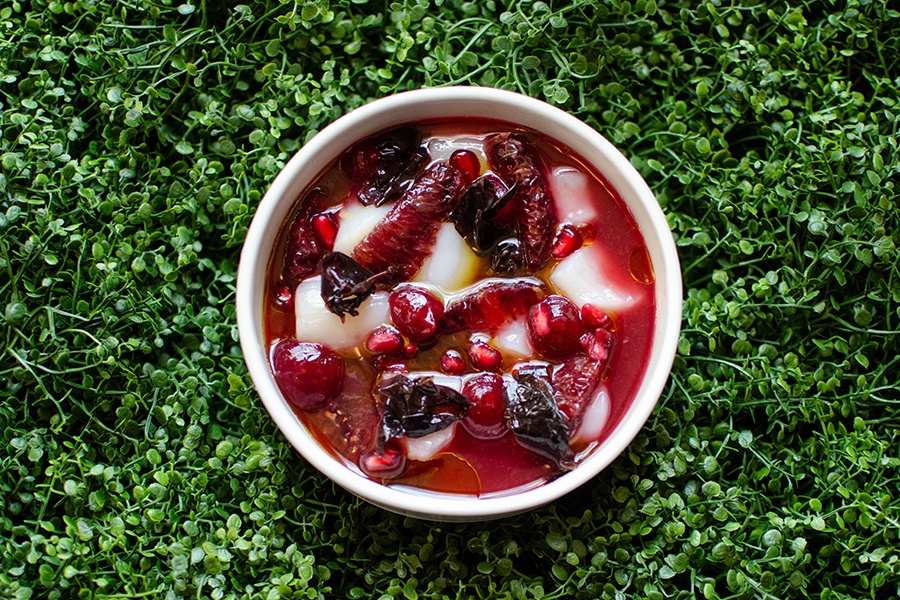
An example of a Fallow Kin seasonal crudo, shown here with Nantucket bay scallops, blood orange, pomegranate, cranberry, and Maine dulse (a red seaweed). / Photo by Rachel Leah Blumenthal
The next era of farm-to-table dining is coming, if Fallow Kin’s owners have their way. Opening early this year, the Cambridge restaurant will serve contemporary New England cuisine that’s laser-focused on sustainability. Local sourcing is important, but Fallow Kin will take things to the next level by elevating vegetables to a starring role and committing to a zero-waste model, all while serving ambitious tasting menus with fine-dining techniques on full display.
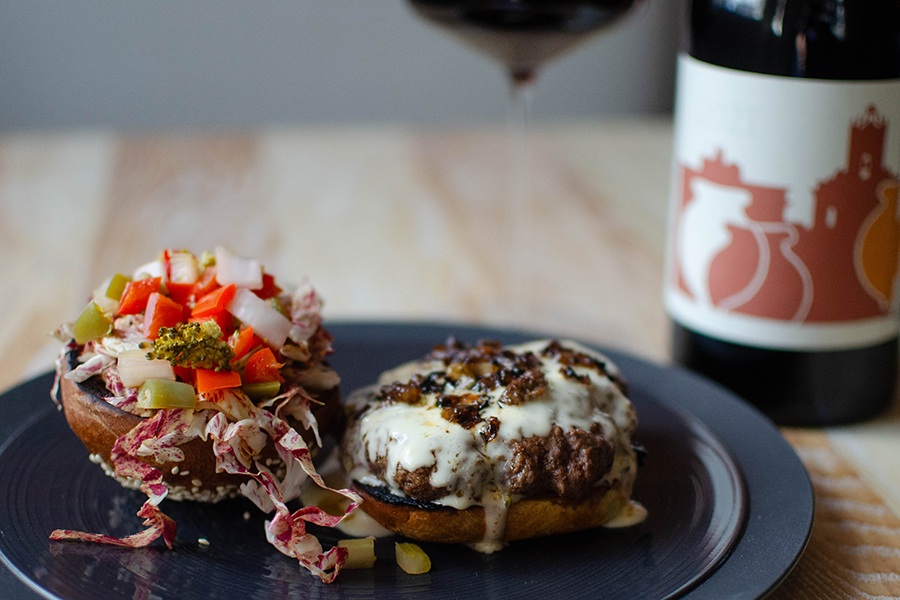
Fallow Kin’s burger, a mix of wagyu beef from Vermont’s Morgan Brook Farm and mycelium, a carbon-neutral mushroom byproduct. Toppings include cave-aged cheddar, onions, and seasonal accoutrements, like the chicory and giardiniera (pickled in the summer) pictured here. / Photo by Rachel Leah Blumenthal
It’s impossible to ignore the history of the Central Square address Fallow Kin will soon inhabit: The space was previously the home of Craigie on Main, Tony Maws’ groundbreaking locavore spot that closed in 2021 after over a dozen years in business. Fallow Kin—from owners Conor Dennehy, Danielle Ayer, and Marcos Sanchez—feels like a full-circle moment in some ways but an evolution in others. The trio’s philosophy embraces that same seasonal, local, utilize-the-whole ingredient ethos of Craigie, but Fallow Kin’s concept is distinctly “vegetable-forward” (their words)—not vegetarian, but designed with meats in a supporting role. Another departure from the past: While Craigie enjoyed much deserved acclaim over its lifespan, it exemplified that particular era of dining where kitchens were typically high-stress and devoid of work-life balance. At Fallow Kin, Dennehy, Ayer, and Sanchez hope to breathe new life into the Central Square corner with a “positive culture focused on warmth and mentorship,” as they previously told Boston.
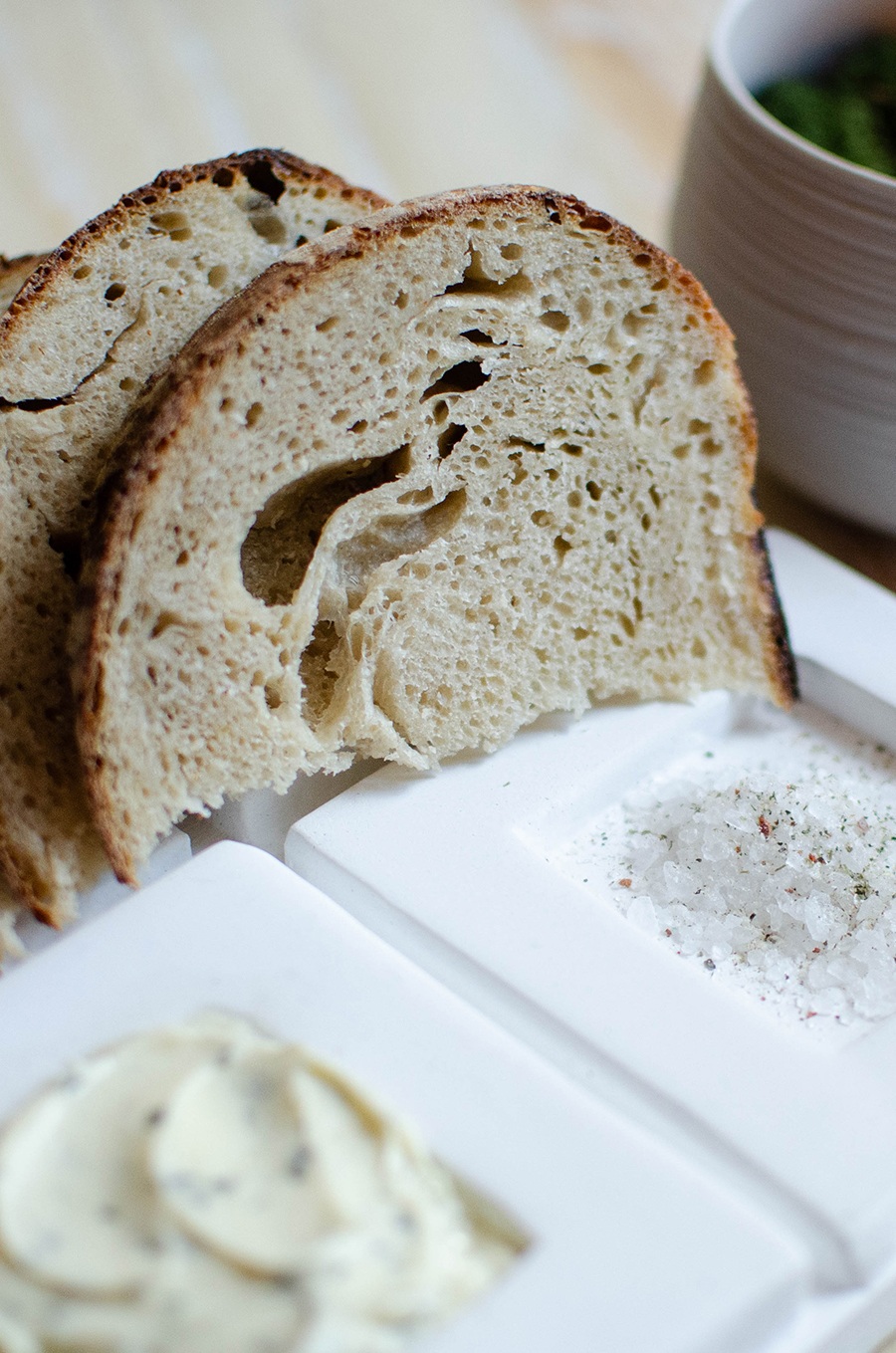
Fallow Kin’s house-made sourdough (with wheat milled in-house) with cultured butter and herb salt. The restaurant will typically offer a few different styles of house-made bread with appropriate accoutrements. / Photo by Rachel Leah Blumenthal
Still, an ode to Craigie feels appropriate. Maws’ restaurant was famous for its burger, and Fallow Kin is excited to serve its own, albeit one that exemplifies what the owners hope the future of dining holds: increased sustainability with a reduced carbon footprint, in part by serving less meat. The Fallow Kin burger is a 50/50 mix of wagyu beef from Vermont’s Morgan Brook Farm and mycelium, the carbon-neutral root-like byproduct of mushrooms. “It was important for us to pay homage [to Craigie] but in our own way and from the heart of the concept,” says Ayer, who serves as the restaurant’s general manager (and is also a skilled sommelier).
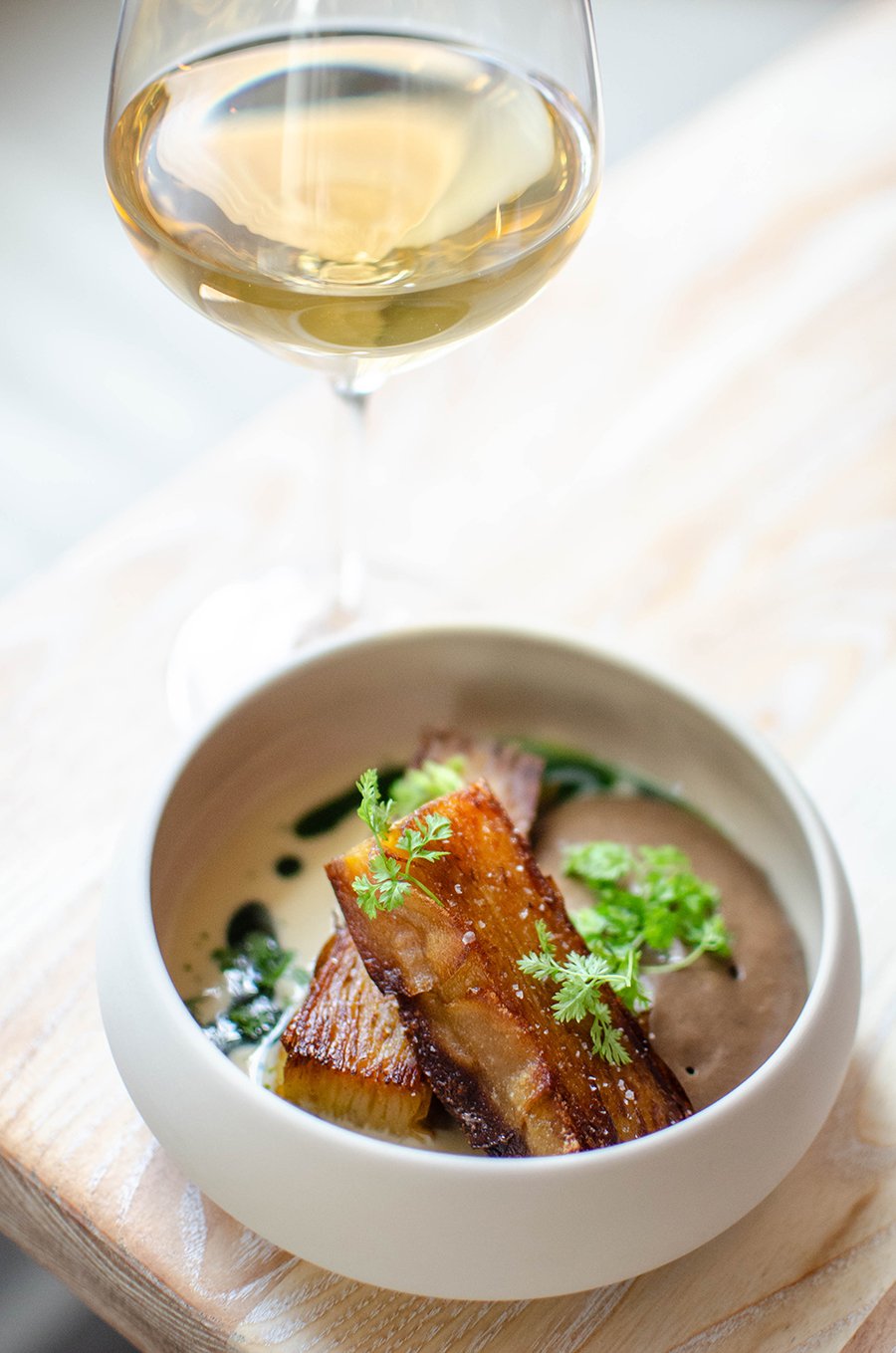
Fallow Kin’s potato mille-feuille with Vermont potatoes, house-made yogurt with black garlic, and crab sauce from green crabs. / Photo by Rachel Leah Blumenthal
The focus on sustainability isn’t surprising coming from Fallow Kin’s team: Dennehy (a James Beard-nominated chef) and Ayer are the husband-and-wife duo behind Cambridge’s Talulla, a fine-dining destination with elegant tasting menus that showcase the team’s relationships with various farmers. Marcos Sanchez, a chef and a longtime friend of the couple, is an alum of Tasting Counter (among other local spots), a now-closed Somerville fine-dining destination with a zero-waste mission.
In practical terms, the zero-waste model means that customers will see throughlines on the menu, where the byproducts of one dish (or drink) are used in others. Take the halibut: It’s poached in the whey that results from the house-made yogurt from another dish, the potato mille-feuille. Or the smoked cabbage, which gets its crunch from bits of crispy chicken skin—other parts of the chicken may show up as, say, chicken sausage on the bar menu. (Fallow Kin will offer three different menus and dining experiences: a tasting menu at the counter; à la carte dining with small-to-medium, meant-to-be-shared dishes; and a more casual bar menu where the zero-waste goal will be particularly highlighted.)
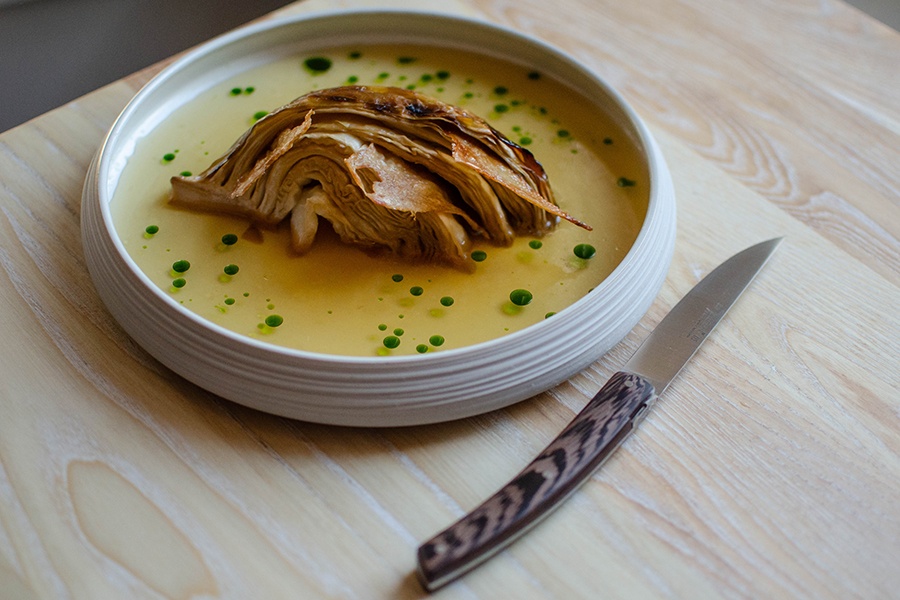
Fallow Kin’s smoked cabbage with crispy chicken skin and “New England dashi” (infused with a roasted blend of Maine seaweed, dried foraged mushrooms, and shallots). / Photo by Rachel Leah Blumenthal
While there’s lots to Fallow Kin’s ideology, and lots of technique on the plate, the menu isn’t meant to intimidate. “We want to be fundamentally simple,” says Dennehy. “No more than a couple ingredients star, and we’re just treating those with different techniques and really want to showcase flavor, texture, color, and seasonality.”
Adds Sanchez: “We’re sourcing great ingredients and really letting them shine.”
Fallow Kin’s drinks will follow suit, with much of the “highly seasonal” cocktail list “built around the byproducts of whatever the kitchen is using,” says James Sutter (Blossom Bar, Birds of Paradise), who is consulting on the restaurant’s bar program. (Plenty of classic cocktails will be on offer as well, he notes.)
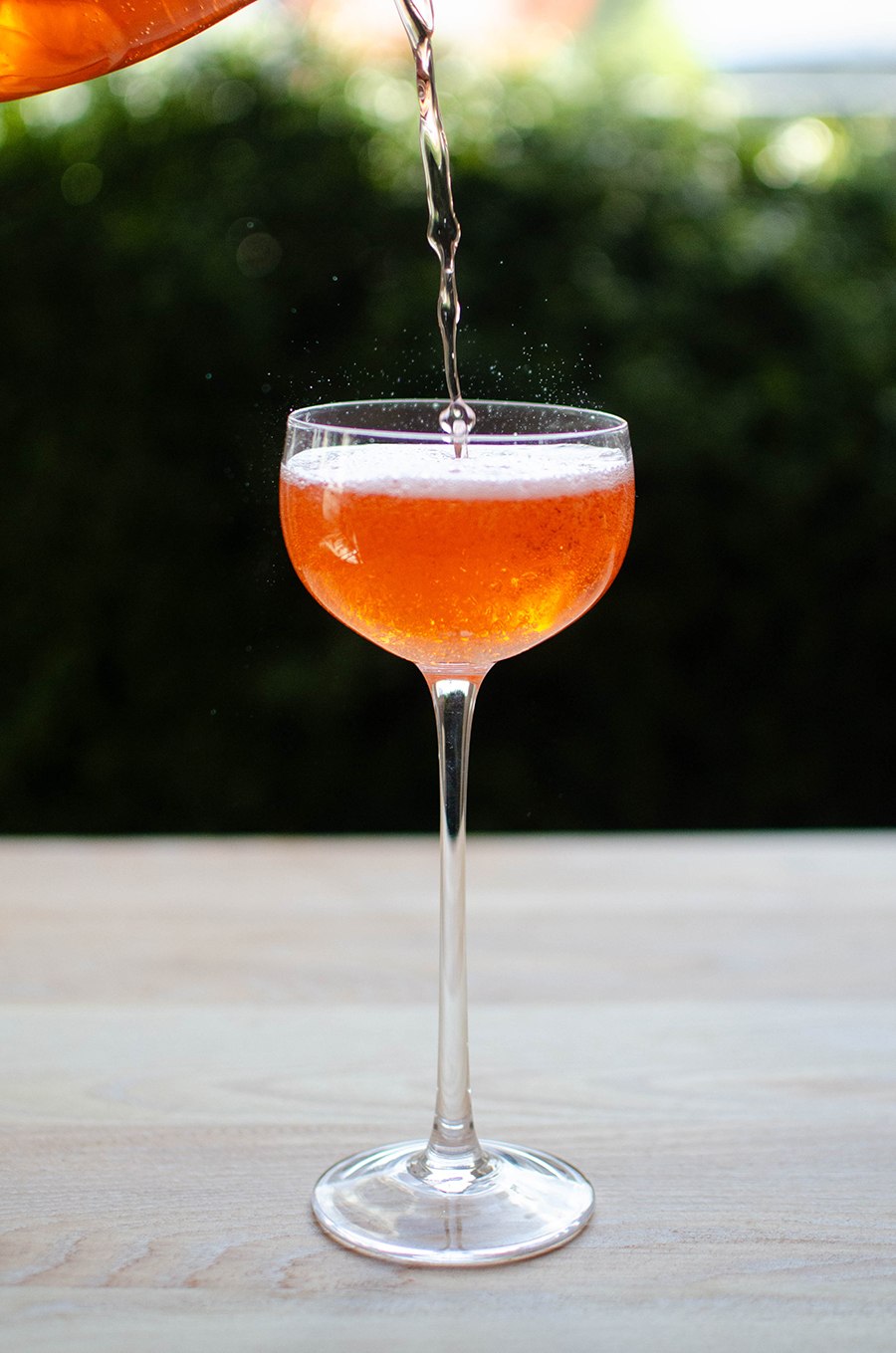
An amazake-style Fallow Kin cocktail with cranberry, koji rice, clairin, a sake-based vermouth, and calamint oil. (A nonalcoholic version will also be available.) / Photo by Rachel Leah Blumenthal
Wines and spirits will be sustainably and ethically produced too. “All the wines that we’ll be working with come from people who are either farming biodynamically or as close to that as possible,” says Ayer, “with love and attention to their lands and animals.”
“Same for the backbar,” adds Sutter. “Products that are made well by people who care.”
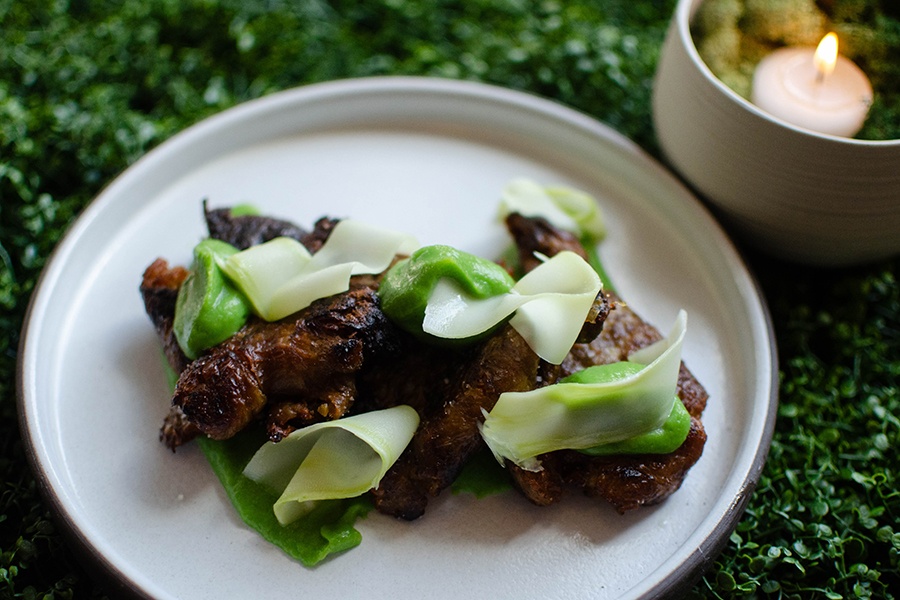
Fallow Kin’s carciofi alla romana-inspired sunchoke dish, with confit sunchokes that are smashed, crisped up, and served with broccoli puree and pickled broccoli stems. / Photo by Rachel Leah Blumenthal
Providing great nonalcoholic options is also important to the team—drinks that “get as much respect as we put into our cocktails and aren’t just a bunch of juices together,” he says. One early example is an Old Fashioned-inspired drink, a combination of buckwheat and black rice washed with butternut squash seed oil and mixed with black sesame, cacao, and nonalcoholic bitters. “It’s like a really big hug of an Old Fashioned, what you’d want out of an alcoholic version of it.”
Fallow Kin’s farm-to-table approach will be reflected in the design of the restaurant, too—a lighter, brighter take on the corner space in which so many locals have dined over the years. With a color palette of natural tones and plenty of textures from wood, stone, and moss elements, “we really want to bring the outside inside,” says Ayer.
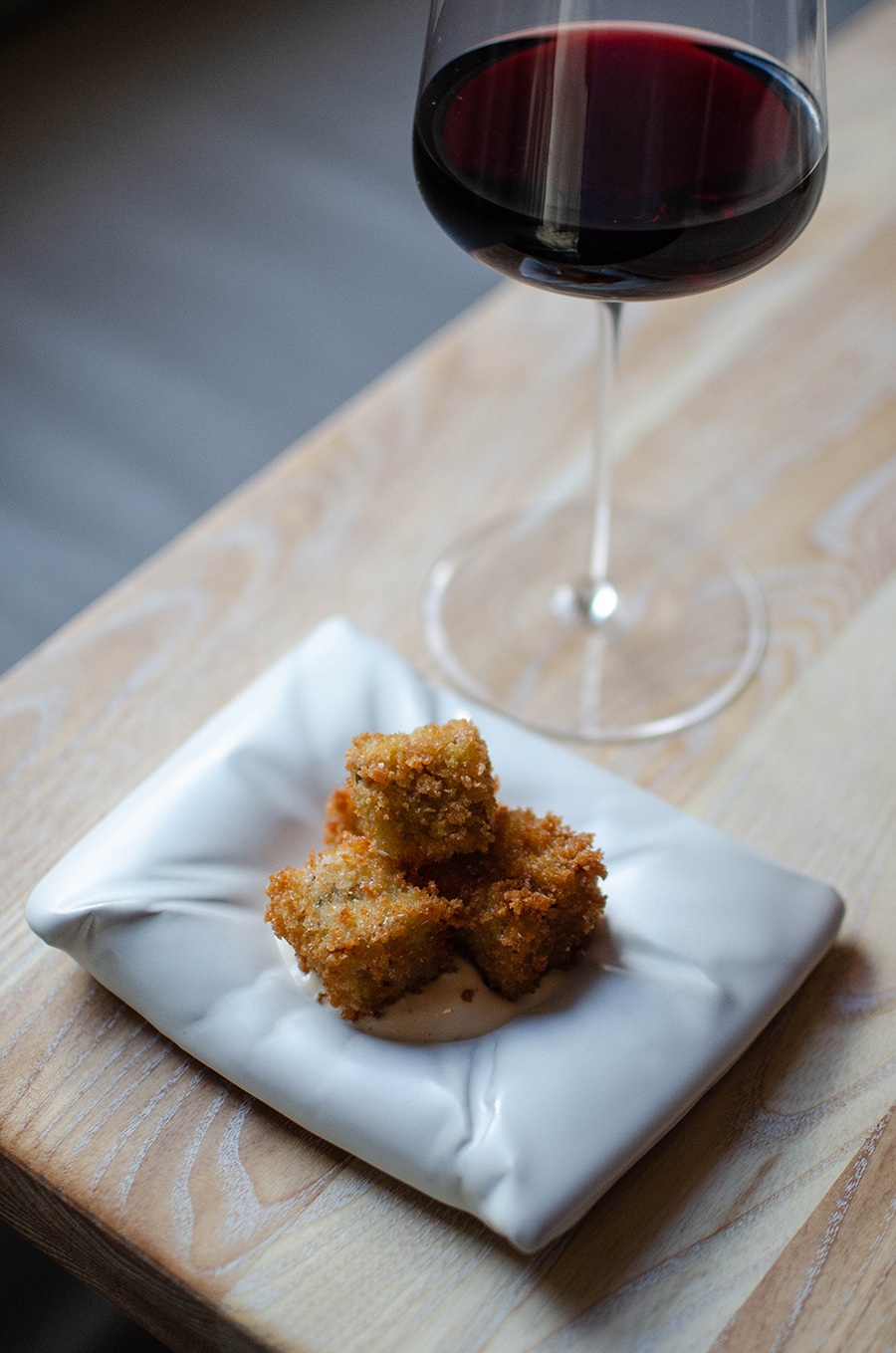
Fallow Kin’s fried head cheese, made with local pork and served with miso mayonnaise. / Photo by Rachel Leah Blumenthal
The literal outside will be in play eventually, too: There’s a small lot that the team hopes to turn into an urban farm and vibrant outdoor dining and gathering space. Think lots of lights, murals by local artists, maybe a separate outdoor kitchen and bar serving a simple menu (grilled vegetables, etc.), and family-friendly vibes. “We want the whole of the space, inside and outside, to be hospitable, warm, welcoming,” says Dennehy.
From the team members’ culinary pedigrees to the multi-pronged sustainability goals, Fallow Kin will surely fit comfortably within Greater Boston’s fine-dining scene. But there’s a distinct down-to-earth quality to it, too, that will give it roots. Says Dennehy, “We’re creating something new out of something simple, without trying to reinvent the wheel.”
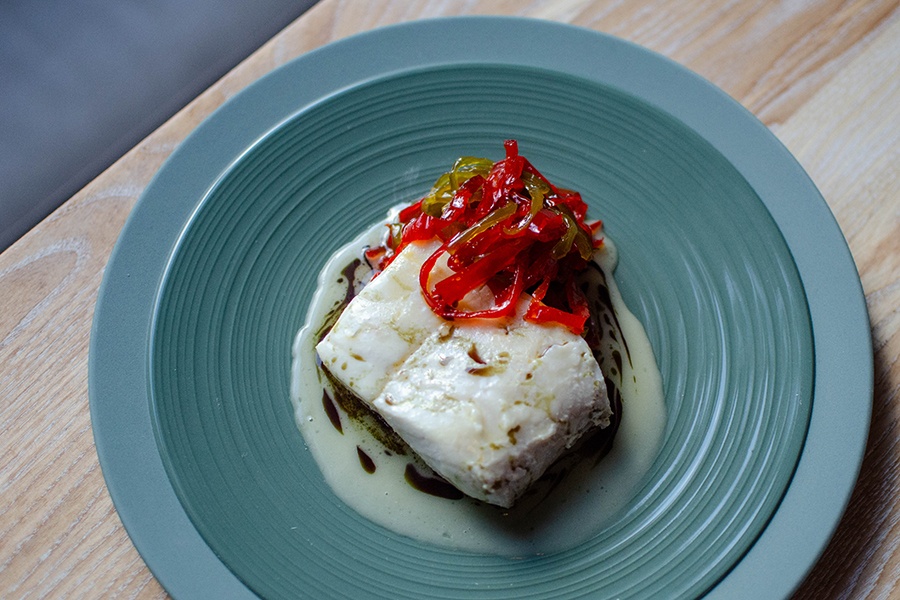
Fallow Kin’s halibut, poached in whey from the yogurt made for another dish (the potato mille-feuille). Preserved peppers, treated with local maple sugar and cider vinegar, accompany. / Photo by Rachel Leah Blumenthal
And diners can engage with the sustainability practices as much or little as they want: Snack on crispy head cheese while mulling over how the rest of the pig was used elsewhere on the menu or just enjoy the meal. Consider the carbon footprint of the burger—or just eat it. Either way, the underlying ethos will be working seamlessly in the background.
Or as Dennehy sums it up: “We want to be something for everybody, but doing it our way and really focusing on ethical, sustainable practices.”
853 Main St., Central Square, Cambridge, fallowkin.com.
A version of this story appeared in the print edition of the February 2025 issue with the headline, “All Taste, Zero Waste.”
